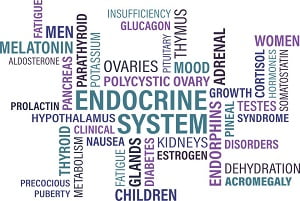Hypothyroidism and Addison’s Disease
- Updated on: Jul 29, 2024
- 4 min Read
- Published on Nov 30, 2020

What Is the Association Between Hypothyroidism and Addison’s Disease
Addison’s disease or adrenal deficiency is characterized by low production of adrenal steroids. It is caused due to destruction of the adrenal cortex region of the adrenal gland.
Hypothyroidism refers to the low secretion of thyroid hormone. Hypothyroidism’s main causes include Hashimoto’s disease (an autoimmune disorder) and thyroiditis (inflammation of the thyroid gland).
Schmidt Syndrome
It is the coexistence of Addison’s disease and hypothyroidism and is also known as polyglandular autoimmune syndrome type II (PAS II). Addison’s disease is the principal manifestation of Schmidt syndrome and autoimmune thyroid disease (usually chronic autoimmune thyroiditis).
Schmidt syndrome can also be associated with other non-endocrine autoimmune disorders, such as vitiligo (loss of skin color ), Sjögren’s syndrome (dry eyes and dry mouth), rheumatoid arthritis, myasthenia gravis (rapid fatigue of muscles under voluntary control), and primary antiphospholipid syndrome (immune system mistakenly attacks normal proteins in the blood).
What Are the Signs and Symptoms of Schmidt Syndrome?
Following are some of the signs and symptoms of Schmidt syndrome:
Addison’s Disease: A rare disorder characterized by the insufficient production of adrenal steroids. The patients are unable to produce glucocorticoid hormones produced by the adrenal gland. These glucocorticoid hormones, especially cortisol and aldosterone, are involved in fat, carbohydrate, and protein metabolism. Patients who have Addison’s disease have an increased sodium level and a decreased level of potassium in the saliva, sweat, stomach, urine, and intestines. Due to the deficiency of glucocorticoids.
Hypothyroidism (Underactive Thyroid): It is a disorder that can be either acquired or genetic. It may exist as a separate disease or a symptom of any other disease. The symptoms associated with this disorder are:
- An enlarged thyroid gland
- Drooping eyelids
- Dry, thin, and coarse hair
- Poor memory
Hypothyroidism may be caused by the hypothalamus’s disorders, pituitary gland, an inherited autoimmune disorder called Hashimoto’s thyroiditis, disorders affecting the release of the thyroid hormone, etc.
Diabetes Mellitus: It is a disorder in which the pancreas fails to produce the correct amount of insulin required to metabolize sugar. Diabetes mellitus either starts in early childhood or adolescence. The patients require daily injections of insulin for the metabolization of sugar. Some of the symptoms associated with this disorder include:
- Frequent urination
- Constant hunger
- Weight loss
- Slow healing of cuts and bruises
- Vision problems
Hypoparathyroidism: This is a disorder characterized by abnormal calcium levels in the blood due to insufficient levels of parathyroid hormones. Symptoms associated with this disorder are:
- Weakness
- Muscle Cramps
- Abnormal sensations of the hands
- Excessive nervousness
Gonadal Failure: This condition refers to the failure of organs that produce sex cells, leading to the absence of secondary sex characteristics.
Pernicious Anemia: This is a blood disorder characterized by an impairment in the absorption of vitamin B-12 ( it helps produce red blood cells). Symptoms of this disorder may be:
- Shortness of breath
- Fatigue
- Weakness
- Rapid heartbeat
- Angina
- Anorexia
Vitiligo: A skin condition characterized by the absence of pigment-producing cells (melanocytes leading to decreased skin pigmentation). In this disease, white-colored blotches or spots appear on the face, neck, hands, abdomen. Sometimes, these spots appear all over the body.
Celiac Sprue: It is a chronic hereditary intestinal malabsorption disorder characterized by gluten intolerance. Commonly found symptoms are:
- Loss of weight
- Abdominal cramping
- Chronic Diarrhea
- Bloating
Myasthenia Gravis: It is a chronic neuromuscular disease in which the patients suffer from weakness and abnormally rapid fatigue of the voluntary muscles. With improvement following rest, this disorder is sometimes associated with autoimmune polyendocrine syndrome type II.
Grave’s Disease: It is a disorder characterized by an abnormality in the thyroid gland. This disorder may lead to hyperthyroidism, enlargement of the thyroid gland, protrusion of eyeballs, etc.
How Can Schmidt Syndrome Be Diagnosed?
The diagnosis of Schmidt syndrome is generally based on the diagnosis of individual disorders found in this disease.
Diagnosis of Addison’s disease (primary adrenal Insufficiency) is based on the following:
- Elevation of basal serum ACTH levels
- The presence of antibodies against 21-hydroxylase may aid in the diagnosis if detectable. Abdominal CT to know other causes of adrenal Insufficiency (infection, hemorrhage, metastases) is recommended.
- Insulin-induced hypoglycemia test to identify Addison’s disease.
- Diagnosis of primary hypothyroidism is based on an elevated serum TSH and low (or normal in subclinical disease) serum T4 level.
- The presence of antithyroid antibodies (e.g., anti-thyroglobulin antibodies thyroid-stimulating immunoglobulins, anti-microsomal antibodies) can be used to confirm autoimmune etiology.
How Can Schmidt Disease Be Clinically Treated?
The treatment of Schmidt disease is based upon the treatment of the individual disorders found in this disease.
Treatment of Hypothyroidism
Replacement of thyroid hormone with levothyroxine. The initial dose is 1.6 mcg/kg per day (low dose in older people and those with cardiac disease) and adjusted every 4-6 weeks to maintain TSH and thyroxine in the normal mid-range. The main goal of hypothyroidism treatment is to normalize the low thyroid hormone levels in the blood.
Treatment of Addison’s Disease
Glucocorticoid and mineralocorticoid replacement therapy is generally given to cure Addison’s disease. Initially, the glucocorticoid regimen can be hydrocortisone 15-25 mg per day in 2-3 individual doses and adjusted to relieve glucocorticoid deficiency symptoms and avoid the manifestations of excessive glucocorticoids.
Mineralocorticoid regimen is fludrocortisone, 0.1 mg/day, adjusted as necessary to monitor blood pressure, weight, plasma renin activity, volume status, sodium, and potassium.
Treatment of Addison’s disease in adults require increased dosage of glucocorticoid therapy according to the degree of physiologic stress.
Patients are generally asked to carry a medical alert bracelet with them and are prescribed hydrocortisone self-injection emergency kit.









